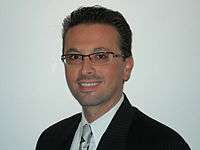George Philippidis
Dr. George Philippidis
 | |
|---|---|
| Education |
BS Chem Eng Ph.D. Chem Eng MBA |
| Occupation | Director |
George Philippidis is a renewable energy leader who has published and spoken extensively about the global need for energy diversification over the last 20 years.[1][2] He advocates the development of renewable and alternative low-carbon power and fuels to enhance energy security, combat climate change, and secure sustainable economic growth.[3] He has authored 11 cleantech patents,[4] written numerous articles, and spoken nationally and internationally on this subject emphasizing that renewable and alternative energy will initially supplement and augment current resources and progressively replace fossil energy, provided that governments institute long-term energy policies promoting the development of and private investment in new energy technologies.[5][6]
A diverse energy portfolio, depending on the local availability of natural resources, includes (1) solar, wind, biomass-to-power, ocean, and geothermal energy for power generation, and (2) renewable hydrocarbons, biomass- and algae-derived biofuels, and electric vehicles for transportation.[7] The private sector and the markets should determine which of those forms of low-carbon energy are most appropriate and cost-effective locally in different parts of the country and the world.
Dr. Philippidis studied Chemical Engineering at the Aristotle University of Thessaloniki in Greece getting a BS and at the University of Minnesota receiving a PhD. He also studied Business Administration at the University of Denver obtaining an MBA. He led strategic business units at the National Renewable Energy Laboratory (NREL) of the US Department of Energy in Denver and at a subsidiary of Thermo Electron Corporation in Boston before becoming Energy Director of the Applied Research Center, the business arm of Florida International University in Miami. Presently, he is Director of the Alternative Energy Research Center and Associate Professor of Biofuel Engineering at the University of South Florida Polytechnic in the Tampa Bay area, where he works with companies and venture capital firms to commercialize clean energy technologies and educates students and professionals in critical energy issues.
He has been advising the federal and state governments on energy policy,[8] venture capital and private equity firms on investment in cleantech, and the private sector in the United States and Latin America on the establishment of a renewable energy industry.[9]
References
- ↑ McFarlane R. and Philippidis G. “How Free Trade Can Help Solve the Energy Crisis”, Wall Street Journal, July 26–27, p. A9 (2008)
- ↑ Philippidis, G. “Energy Security Achievable with Biofuels Made in the Americas”, Ethanol Producer Magazine, Vol. 14, Issue 8, pp.232-235, 2008
- ↑ Philippidis, G. “Chapter 5: Energy Diversity Based on U.S. and Latin American Biofuels” in From Energy Crisis to Energy Security, Foundation for Defense of Democracies, pp.69-79, 2008
- ↑ US Patent and Trade Office
- ↑ Philippidis, G.P. "Chapter 12: Cellulose Bioconversion Technology", in Handbook on Bioethanol: Production and Utilization, C.E. Wyman (ed), Taylor & Francis, Washington DC, pp.253-285, 1996
- ↑ Morris, R. "Algae may be secret weapon in climate change war, Agence France-Presse (AFP), Oct. 21, 2009
- ↑ Maidique, M. and Philippidis, G. "Diversifying our energy is imminent security concern", Miami Herald, October 26, pp.1L-2L, 2008
- ↑ Hemlock, D., "Brazil's fields of fuel", Sun-Sentinel, 2007
- ↑ Miller, L. "US Embassy Montevideo Hosts Alternative Energy Expert", Sep. 17, 2008